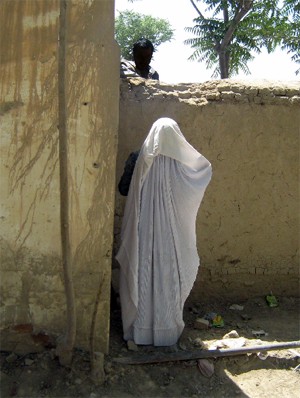MAZAR-I-SHARRIF - High food prices, drought, unemployment and lack of socio-economic opportunities are pushing some women and young girls in northern Afghanistan into commercial sex work, women’s rights activists and several affected women told IRIN.

Sex work is on the rise due to high food prices, unemployment and lack of economic opportunities for vulnerable women, women's rights activists say (Photo: Parwin Arizo/IRIN)
“I have no way of feeding my children other than by doing this disgusting job,” said 27-year-old Nasima (not her real name), a commercial sex worker in Balkh Province.
Clad in a blue `burqa’, Najiba, a sex worker in Mazar-i-Sharrif, the provincial capital of Balkh Province, said she had been pushed into sex work after food prices started rising dramatically in November 2007.
“I am a widow and I have to feed my five children. I am illiterate and no one will give me a job. I hate to be a prostitute but if I stop doing this job my children will starve to death,” Najiba told IRIN.
Most women who turn to sex work are illiterate widows who lack professional skills to find alternative employment, according to Malalai Usmani, head of a local women's rights non-governmental organisation (NGO) in Balkh.
“Extreme poverty and the obligation to feed their dependents have increased prostitution among women,” Usmani said.
Severe penalties
In Afghanistan sexual relations between a man and a woman outside marriage are considered a serious crime and offenders can face death penalty and/or a lengthy prison sentence, depending on their marital status and other circumstances.
Every year hundreds of female sex workers are sent to prison for allegedly having “unlawful sexual relationships”, according to women’s rights activists such as Usmani.
“This [sex work] is an abhorrent deed and an appalling crime. We encourage and help security forces to arrest and punish women involved in prostitution,” said Fariba Majid, director of the Women’s Affairs Department in Balkh Province.
Majid acknowledged that many female sex workers have no other option, but warned that the country’s Islamic laws and conservative culture meant prostitution was “unacceptable”.
Sex workers are also exposed to stigma and discrimination. “We cannot live in one place for long,” said a middle-aged sex worker who refused to be identified. “We move as soon as local people become suspicious of us.”
“People will spit on us and no one will interact with us if they know about our work,” she added.
Afghanistan launched its first ever national HIV/AIDS control programme in 2003. At least 436 HIV/AIDS cases have been confirmed over the past five years, according to the Ministry of Public Health.
Health specialists warn that sex workers, intravenous drug users, truck drivers and other vulnerable groups have very little knowledge about sexually transmitted diseases and preventive measures.
At least three female sex workers interviewed by IRIN said they paid no attention to HIV, and had not used condoms to avoid infection and/or the spread of the virus.
“I don’t know about HIV/AIDS,” said a female sex worker who preferred anonymity. “I have not seen any of my clients using a condom.”
Saif-ur-Rehman, director of the National HIV/AIDS Control Programme in Kabul, said there was a widespread lack of awareness about sexually transmitted diseases and HIV among commercial sex workers.
“We will launch a project to boost awareness and introduce preventive measures among sex workers hopefully in September [2008],” Rehman told IRIN, adding that the distribution of free condoms would be part of the project. “It’s a very sensitive project and we will try to avoid misconceptions that it supports or encourages prostitution in Afghanistan.”



